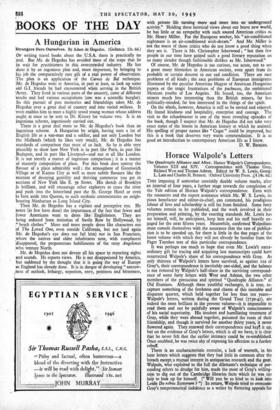BOOKS OF THE DAY
A Hungarian in America• 'Strangers Here Ourselves. By Adam de Hegedus. (GoLlancz. 12s. 6d.) Or writing travel books about the U.SA. there is practically no 'end. But Mr. de Hegedus has avoided most of the traps that lie in wait for practitioners in this overcrowded industry. He has done it by an ingenious plan and, more important, by bringing to his job the comparatively rare gift of a real power of observation. The plan is an application of the Carnet de Bal technique. Mr. de Hegedus went to America, in part at least, to look up some old G.I. friends he had encountered when serving in the British Army. They lived in various parts of the country, came of different 'stocks and had various occupations (one was a scientific burglar). So this pursuit of past memories and friendships takes Mr. de Hegedus over a great deal of country and into varied milieus. It -even enables him to meet a highly sexed young woman whose address ought at once to be sent to Dr. Kinsey for volume two. It is an ingenious scheme, ingeniously carried out.
There is a great deal more to Mr. de Hegedus's book than an ingenious scheme. A Hungarian by origin, having seen a lot of English life as a van-man and a soldier, and not only London but the Midlands (which he likes very much), Mr. de Hegedus has standards of comparison that most of us lack. So he is able very plausibly to show how New York is in part like Paris, in part like Budapest, and in part like Liverpool—and not at all like London. -It is not merely a matter of ingenious comparison ; it is a matter of masterly composition of place. For this book does convey the flavour of a place admirably well ; the atmosphere of Greenwich Village or of Kansas City as well as more subtle flavours like the mixture of decaying gentility and thriving commerce you get in sections of New York like E. 39 Street. His sketch of Brooklyn is brilliant, and will encourage other explorers to cross the river and push into the hinterland past the St. George Hotel or even to Turn aside into Queens, to such sardonic commentaries on neigh- bouring Manhattan as Long Island City.
Then Mr. de Hegedus has a vigilant and perceptive eye. He notes (is few have done) the importance of the fact that fewer and fewer Americans want to dress like Englishmen. They are being seduced from imitation of Savile Row by Hollywood, by ," beach clothes." More and more people dress like characters out of The Loved One, even outside California, but not (and again Mr. de Hegedus's eye does not fail him) not in San Francisco, where the natives and older inhabitants note, with complacent 'disapproval, the preposterous habiliments of the stray Angelenos who venture North.
Mr. de Hegedus does not devote all his space to reporting sights and sounds. He reports views. He is not disappointed by America, but saddened by the thought that it is going the way of Europe as England has already done. It is in danger of developing "narrow- ness of outlook, lethargy, nepotism, envy, pettiness and bitterness,
with private life turning more and more into an underground activity." Holding these heretical views about our brave new world, he has little or no sympathy with such soured American critics as Mr. Henry Miller. For the European worker, his "air-conditioned nightmare is an air-conditioned wish-dream." And Mr. Miller is not the worst of those critics who do not know a good thing when they see it. There is Mr. Christopher Isherwood ; "but then few people in our time have gained such a good literary reputation on so many slender though fashionable dislikes as Mr. Isherwood."
Of course, Mr. de Hegedus is too curious, too acute, not to see a great many blemishes in American society, even apart from its probable or certain descent to our sad condition. There are race problems of all kinds ; the race problems of European immigrants illustrated by the peculiar American Magyar of American Hungarian papers or the tragic frustrations of the pachucos, the embittered Mexican youths of Los Angeles. He found, too, the American miners much less interesting than the British miners, far less politically-minded, far less interested in the things of the spirit.
On the Whole, however, America is still to be envied and enjoyed. He found kindness and hospitality, enterprise and courage. The visit to the schoolmaster is one of the most revealing episodes of the book, though I suspect that Mr. de Hegedus did not take very exact notes of the lesson in American history at which he assisted. His spelling of proper names like " Cugat " could be improved, but this is a book that deserves very warm commendation. It is as good an introduction to contemporary American life as I know. D. W. BROGAN.










































 Previous page
Previous page